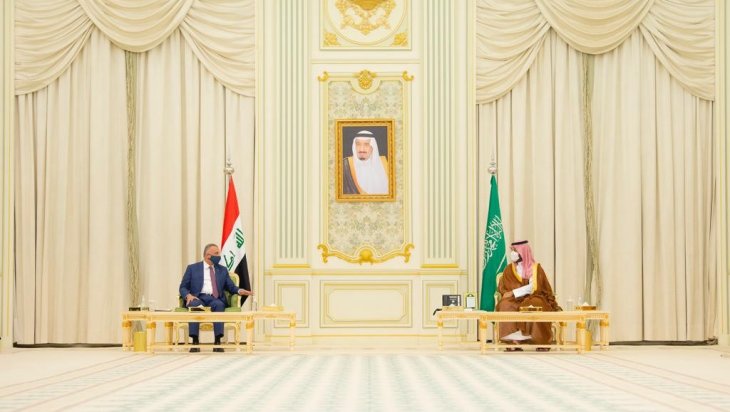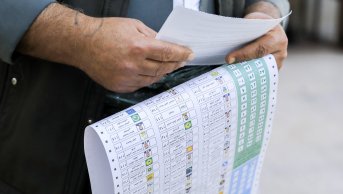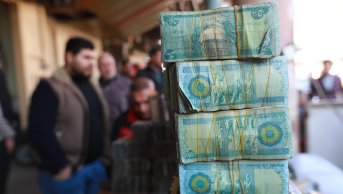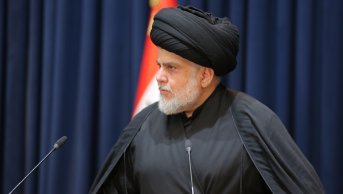Al-Kadhimi’s Quest for Balance in Foreign Policy

After the military presence of the terrorist group ISIS in Iraq was eradicated, some foreign policy openings were developed in the country in order to attain social consensus. The visits by Haider al-Abadi, former prime minister of Iraq, to Saudi Arabia, Kuwait, and Iran approximately three months before victory was declared against ISIS are evaluated in this context. Maintaining balance in foreign policy and reaching consensus among the Iraqi components are two main objectives in accordance with Prime Minister Mustafa al-Kadhimi’s principle of “promoting common values for all Iraqi citizens and rejecting discrimination”, which is among the priorities of the government program that was approved on 7 May 2020. Following that, the new opening in foreign policy that started in the Abadi period has continued during the tenure of Adil Abdulmahdi and Kadhimi, which formed the government after the 2018 Parliamentary Elections. Therefore, the talks started in the second half of 2017, slowed down in the election year of 2018, and continued in 2019 and 2020. In 2021, the initiatives for improving foreign policy stakeholders gained momentum in March and continued with the talks with Qatar, Saudi Arabia, the United Arab Emirates, and the Arab League.
The Visit by Foreign Minister Sheikh al-Thani of Qatar
On 24 March 2021, a Qatari delegation led by Deputy Prime Minister and Foreign Minister Sheikh Muhammad bin Abdul Rahman al-Thani paid an official visit to Prime Minister Kadhimi of Iraq. According to the written statement by the Iraqi Prime Minister’s Office about the scope of the visit, the main agenda items were declared as “mending the bilateral relations, showing efforts for common interest in regional issues and minimizing problems. At the same time, issues related to the economy, security, and investment were also tackled as secondary matters.
After meeting with al-Kadhimi, Sheikh al-Thani met with Foreign Minister Fuad Masum of Iraq stated that they have reached a deal on activating the Iraq-Qatar Joint Economic Cooperation Committee. It shows that boosting economic cooperation potential is one of the main concerns of Sheikh al-Thani in Iraq. After his Baghdad program, Sheikh al-Thani traveled to Erbil and met with Prime Minister Nechirvan Barzani of the Iraqi Kurdish Regional Government (KRG). At that point, there were also deliberations on the opening of a Qatari consulate in Erbil as agreed in Sheikh al-Thani’s visit to Baghdad in January.
Al-Kadhimi’s visit to Saudi Arabia
On 31 March 2021, Prime Minister Mustafa al-Kadhimi traveled to the capital city Riyadh of Saudi Arabia and was welcomed by Crown Prince Muhammad bin Salman. During the welcoming ceremony in his honor, a 21-rifle salute was performed as well as an air show by the Saudi Air Force focusing on the colors representing the Iraqi flag. After the ceremony, al-Kadhimi and Muhammad bin Salman held a delegation meeting on the issues of “strengthening bilateral relations, economy, energy, security, investment, and border security”. During the meeting, the importance of Iraq for regional security was emphasized and the activation of the Saudi Arabia Investment Fund for contributing to the stability was discussed.
Five memoranda of understanding were signed in al-Kadhimi’s visit to Saudi Arabia. Among these agreements were those that involve preventing double taxation, export financing by Saudi Arabia, diversifying private sector and economic activities, and cooperation between national archives and national news networks in a way to solidify the momentum in the relations. In addition to the delegation meetings, al-Kadhimi and King Selman bin Abdulaziz of Saudi Arabia held an online meeting in which they reached a consensus on issues such as expanding bilateral cooperation, establishing a joint investment fund, ensuring harmony in OPEC and OPEC+ meetings, and building electricity transfer stations.
In addition to the official talks, there was one more meeting with the business community, which became a tradition in al-Kadhimi’s visits. Al-Kadhimi reminded that the Arar border gate was reopened after thirty years and stated his expectation that the current momentum in the political sphere should be maintained in economic activities.
Al-Kadhimi’s visit to the United Arab Emirates
Prime Minister Mustafa al-Kadhimi returned to Baghdad after his Saudi Arabia visit and traveled to the United Arab Emirates (UAE) on 4 April 2021. Al-Kadhimi was welcomed by Abu Dhabi Crown Prince Muhammad bin Zayed in an official ceremony held in Qasr al-Watan. After the welcoming ceremony, al-Kadhimi and Muhammad bin Zayed led delegation meetings that focused on expanding bilateral relations and steps to be taken to ensure stability in Iraq. Then, al-Kadhimi met with Prime Minister Muhammad bin Rashid al-Maqtum and discussed cooperation possibilities.
A joint declaration was issued about the agreement between Iraq and the UAE reached during the visit. The declaration published by the Iraqi Prime Minister’s Office includes a call for increasing the cooperation possibilities. It also mentions the Covid-19 aid that the UAE positively provides for Iraq. In addition, the leaders decided to establish Iraq-UAE Business Council, which will manage a fund that the UAE will donate three billion US dollars. In addition to the joint decision to boost security relations, Iraq expressed gratitude over the initiatives by the UAE to rebuild the Great (al-Noori) Mosque in Mosul, Hadba Minaret, and some churches in the province of Ninevah.
The Visit to Baghdad by Ahmed Aboul Gheit, Secretary-General of the Arab Union
On April 10, 2021, Secretary-General Ahmed Abuoul Gheit of the Arab League visited Baghdad and met with Prime Minister Mustafa al-Kadhimi. During the meeting, Aboul Ghait expressed his gratitude to Iraq for its activities in the Arab League and its willingness to host the next Arab League summit. Al-Kadhimi stated Iraq’s support for the Arab League in its efforts for the conflict in Yemen and instability in Lebanon. Furthermore, al-Kadhimi underlined the importance of the Arab League’s role to bring together the Arab states, which take different positions. Aboul Ghait stated that the Arab League commends the efforts by Iraq to create a balanced type of relations with its neighbors.
Aboul Gheit met with Foreign Minister Fuad Hussein of Iraq after he met with al-Kadhimi. During the presser after the meeting, Minister Hussein stated that one of the main issues discussed in the meeting is about holding a dialogue with other countries about Syria. He also underlined that the instability in Syria poses threat to Iraq. Aboul Gheit also met with Muhammad al-Halbousi, Chairman of the Iraqi Parliament, who stated that Iraq will support all initiatives by the Arab League aimed at resolving problems. Aboul Gheit was also received by President Bahram Salih of Iraq and stated that they have reached a consensus on initiating dialogue for resolving problems.
Secretary-General Aboul Gheit traveled to Erbil after Baghdad and was welcomed by Rebar Ahmad, Interior Minister of the KRG in Erbil International Airport. Then Aboul Gheit met with Mesud Barzani, former President of the KRG and President of the Kurdistan Democratic Party (KDP), and with Prime Minister Masrour Barzani of the KRG.
The government of al-Kadhimi continues the quest for balanced foreign policy because the effects of the unilateral policies of the former Prime Minister Nouri al-Maliki’s second term, which has become the main approach of the Iraqi foreign policy, have been overcome. Iraq also continues its calls for dialogue and consensus for regional matters during the tenure of al-Kadhimi for boosting the international legitimacy of the new regime emerged after 2003. Hence, the rise in diplomatic activism since the beginning of al-Kadhimi’s term. Additionally, one can argue that as Iraq acquires a balanced approach in its international relations, a similar balance occurs between its domestic components, which positively affects internal stability. At this point, the Arab League stands out as an actor supporting Iraq’s neutrality in the US-Iran conflict over itself as seen in the calls of Aboul Gheit for reducing the external influence in the Arab world and the statements made by al-Kadhimi. Beyond the claims of neutrality, it is evident in Iraq’s policies of rapprochement with Saudi Arabia and the UAE and in the steps taken for facilitating economic activities of some countries in the country that Iraq is implementing a policy of moving further away from Iran to resolve problems in the context of the neutrality principle.
In this context, Iraq opted for relations with the regional countries as its first priority. Al-Kadhimi had already visited Turkey before and he is likely to seek rapprochement with Saudi Arabia in order to balance Iran, which seeks to utilize the relation between religion and politics. Therefore, al-Kadhimi seeks to balance Iran while reconstituting Iraq’s ties with other neighboring countries. He also refrains from ignoring regional balance since Saudi Arabia, Qatar and UAE are important countries of the Gulf region. Al-Kadhimi’s visit to the UAE just after the Qatari delegation’s Baghdad visit is also very important. That is particularly significant since the UAE supported the KRG independence referendum and al-Kadhimi is known for his efforts to reinforce his power and to strengthen the central government’s constitutional power in the entire country. Maintaining good relations might prevent the UAE from pursuing local politics within Iraq. It is also well known that both Saudi Arabia and the UAE have relations with particularly Sunni opposition groups in Iraq. Therefore, maintaining close relations with Saudi Arabia and the UAE will likely bring these countries closer to centrist politics and reduce the fragmentation of Iraqi domestic politics. Considering the parliamentary elections to be held on 10 October 221, it is likely that al-Kadhimi, who has little group support in domestic politics for its preparation for the elections, seeks domestic political advantage through foreign policy openings and economic support from the countries mentioned above.








